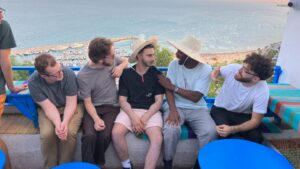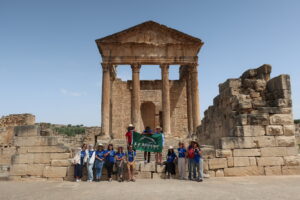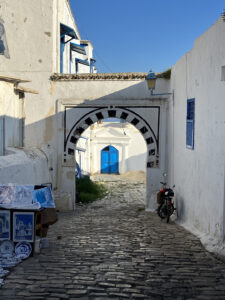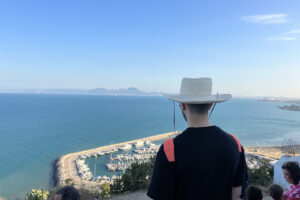Immersion in Tunisia

Fatima Abraham ’26 has always been intrigued by travel and interested in experiencing different cultures, particularly those in North Africa and the Middle East. A biology major from Warners, N.Y., Abraham believes firmly that learning about and experiencing other cultures is vital in order for people to understand and appreciate one another’s differences. As she put it: “The root of racism and discrimination is ignorance.” Naturally, when Abraham was presented with the opportunity to travel to Tunisia with several Le Moyne faculty members, students and recent graduates, she leapt at it.
 Abraham and her peers spent four weeks immersing themselves in Arabic language as they studied at the Bourguiba Institute in the capital, Tunis, and explored the country’s history, customs, music and even its food as they visited prominent cultural sites. The trip was led by Douja Mamelouk, Ph.D., associate professor of Arabic and French who grew up in Tunisia, and Delia Popescu, Ph.D., professor of political science. They had co-taught a popular course called “Politics and Culture in Tunisia.” Both professors expressed their desire for the participants to be broadened and inspired by their time overseas. By the time they returned home, the students and alumni found that not only had their Arabic improved, but they had come to think of themselves differently, as part of the broader global community.
Abraham and her peers spent four weeks immersing themselves in Arabic language as they studied at the Bourguiba Institute in the capital, Tunis, and explored the country’s history, customs, music and even its food as they visited prominent cultural sites. The trip was led by Douja Mamelouk, Ph.D., associate professor of Arabic and French who grew up in Tunisia, and Delia Popescu, Ph.D., professor of political science. They had co-taught a popular course called “Politics and Culture in Tunisia.” Both professors expressed their desire for the participants to be broadened and inspired by their time overseas. By the time they returned home, the students and alumni found that not only had their Arabic improved, but they had come to think of themselves differently, as part of the broader global community.
It was impressive to see students react to a new environment, embrace it, and start to venture outside their comfort zone. By the time they left, the students were truly attached to Tunisia and understood the transformative value of spending a month there learning the language and travelling around.
The program was rigorous. Classes were held five hours a day, five days a week, and were conducted entirely in Arabic using textbooks without English translations. The students were drilled in grammar, vocabulary and pronunciation. The approach proved to be effective. Caleb Schwarz ‘24, a French major with minors in Middle East and Islamic studies and history said that his Arabic comprehension improved “exponentially.” Mamelouk noticed growth in the students’ language skills within a few days of their arrival in Tunisia, particularly as they walked around Tunis, whether they were ordering food, bartering at a market or asking for directions. It reinforced for her how critical immersion is to an effective language education program. There is no substitute for simply inhabiting a place, even for a little while.
That idea that simply “being there” can have huge implications certainly proved to be the case for Preston Long ’23. A history major with minors in anthropology and Middle East and Islamic studies on the Heights, Long has always had a deep appreciation for Middle Eastern literature. However, he worried that by reading English translations of some of the works he most admired he might lose some of their richness and meaning. That is what inspired him to travel to Tunisia. Over time, not only could Long better appreciate some of the books and poems he loves in their original language, but his grasp on of Arabic became firm enough that he could forge meaningful friendships with people who do not speak English. Now a graduate student in geography at SUNY Binghamton, Long also credited the trip with making him more well-rounded.
In a world that is more and more specialized, I think it’s important to have a wide variety of experiences and abilities, to develop yourself as fully as you can.
Indeed, the most impactful moments of the trip came when the current and former students were simply out exploring the country. Mamelouk took the lead in planning and hosting the group’s excursions. Together they attended the International Festival of Carthage, a world-renowned annual musical event; visited one of the five holiest cities in Islam (Kairouan); and met with U.S. ambassador to Tunisia Joey Hood. (The latter was possible thanks to James Grabowski ’82, vice president of field operations for the nonprofit organization Amideast.) They also enjoyed some of the beautiful beaches of the Tunisian coastline, and walked along Roman, Carthaginian and Punic ruins in Dougga, which Allyson Farnand ’24, a political science major and biology and business administration from Rochester, N.Y., described as “pristine – as if they had been frozen in time.”
 Perhaps most important, the visitors soaked up what both Elisa Hoffman ’24, a physics major from Buffalo, N.Y., and Khalid Al-Sadoon ’25, a psychology major from Liverpool, N.Y., both called the “incredible hospitality and warmth” of the Tunisian people, from their tour guide, to the friend of one of their professors who invited them to dinner in his home, to the people who simply took the time to say “hello” as they passed by on an ordinary day.
Perhaps most important, the visitors soaked up what both Elisa Hoffman ’24, a physics major from Buffalo, N.Y., and Khalid Al-Sadoon ’25, a psychology major from Liverpool, N.Y., both called the “incredible hospitality and warmth” of the Tunisian people, from their tour guide, to the friend of one of their professors who invited them to dinner in his home, to the people who simply took the time to say “hello” as they passed by on an ordinary day.
Now that she is back in the United States, Abraham, the biology major from Warners, N.Y., is once again absorbed in the life of a busy college student and ensconced in a place she knows well. Her days are filled with classes and labs, work and extracurricular activities, and spending time with family and friends. Yet Tunisia is never too far from her mind. Now more than ever she believes it is critical for people to learn about and explore other cultures, and to connect with them in ways they hadn’t before. She is reminded of this particular passage from the Qu’ran:
“’As God says in the Quran: “[We] made you into peoples and tribes so that you may [get to] know one another.’”
Take a Deeper Dive
Inspired by Their Journey?
Our students' journey in Tunisia shows the transformative power of cultural immersion. Explore more ways to broaden your global perspective and make meaningful connections through our programs.



